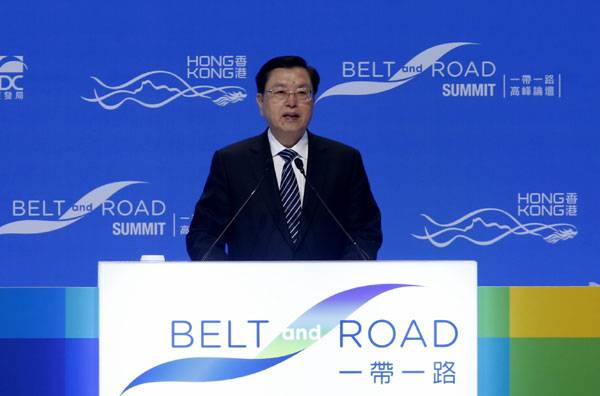China will host the first Summit of the Belt and Road Initiative (BRI) in May 2017. This initiative is hugely consequential, as the world is witnessing changes on a civilisational scale.
Revival of the ancient Silk Road and the quest to rediscover the bonds between the east and west has solid historical and civilisational underpinnings.
A simplistic history of civilisation, according to Anthropologist Eric Wolf, is that, “Ancient Greece begat Rome, Rome begat Christian Europe, Christian Europe begat the Renaissance, the Renaissance the Enlightenment, the Enlightenment political democracy and the industrial revolution, industrial revolution crossed with democracy in turn yielded the United States, embodying the rights to life, liberty and the pursuit of happiness.”
‘The Silk Roads: A New History of the World’, by Peter Frankopan states that, “seeing Rome as the progenitor of western Europe over looks the fact that it consistently looked to and in many ways, was shaped by influences from the East.”
According to Frankopan, “in many ways, the late twentieth and early twenty first centuries have represented something of a disaster for the United States and Europe as they have played out their doomed struggle to retain their position in the vital territories that link east with west”.
He attributes this to the west’s “lack of perspective about global history-about the bigger picture, the wider themes and the larger patterns playing out in the region.” He adds that, “the age of the west is at a crossroads, if not at an end.” The period of ‘transition’ and ‘turbulence’ may last until 2040. He also refers to “the ‘heart of the world’ that is taking shape in the form of institutions and organisations that formalise relations across the pivotal (Eurasian) region.”
In the current global context, BRI has assumed special significance. Anti-globalisation sentiments, building of walls and protectionist barriers to restrict the movement of people and goods and the stalling of processes of regional economic integration is compelling a certain reversal of roles.
There is also plenty of evidence of accentuation of ethno-centric nationalistic sentiments, xenophobia and an abandonment of liberal ideals and values.
Asia is not immune from these trends. There is a proclivity on the part of some to follow policies predicated on geo-political alignments, balance of power, and military alliances. This old-school thinking is a recipe for disaster and would perpetuate cycles of crises and conflicts.
In an interdependent world, there are limits to geo-political power play, limits to exercising military power and limits to being nuclear. New thinking must shape the way forward.
The Belt and Road provides the alternative. It signifies a new wave of globalisation propelled by the East. It is bound to be infused by Asian/universal values and in no way means a rejection of the west.
The true significance of the BRI is that; it eschews theories of geo-politics and power play, provides an alternative vision for a better future, provides a path to realising the humanistic vision of a shared destiny, is inclusive, voluntary, flexible and pragmatic and is enthused by high civilisational values.
The concept of a shared destiny, forging of win-win partnerships, and voluntary cooperation are the foundational principles of the Belt and Road.
China has created the necessary cooperative mechanisms (such as the Silk Road Fund, Asia Infrastructure Investment Bank) and brought its intellectual, technological and financial prowess together to make it happen.
Pakistan is privileged to work the first flagship project of the Belt and Road – the China Pakistan Economic Corridor (CPEC). It envisages building the requisite infrastructure for connectivity; energy generation and distribution; operationalising of Gwadar port and setting up special economic zones. Gwadar and Karachi on the Arabian Sea are destined to become the regional hubs for commerce, finance and energy transactions. Iran-Pakistan-China gas pipeline could soon become a viable option as would a Gwadar-Chabhar corridor.
The economic landscape of Pakistan is being rapidly transformed. CPEC is a huge vote of confidence in Pakistan’s economy. The required institutional structures and frameworks are already in place. These include inter-alia, the Pakistan-China Free Trade Agreement, the Joint Investment Company and currency swap arrangements.
CPEC is an excellent example of mutual benefits that would accrue from the Belt and Road. CPEC is also a starting point for building ever expanding circles of win-win cooperation schemes, stability and peace extending from Pakistan and China to Eurasia and Africa.
The Economic Cooperation Organisation Summit, held in Islamabad in March 2017, welcomed CPEC. Participation of Afghanistan and Iran in CPEC processes and projects would be good for the region. Such cooperation could also be extended to the Gulf, Central Asia and Africa. The US, UK and other states have lately started to take cognisance of BRI’s tremendous transformative potential.
Currency swap arrangements could be replicated belt-wide. Enormous dividends could be accrued by making the Chinese Yuan the lead currency for transactions.
The Euro land-bridge projects are developing at a fast pace. The inaugural run of the freight train from Yi Wu to London is a spectacular display of progress in forging pragmatic win-win cooperative alliances.
The sea routes are also receiving attention. The building of ports by China such as Gwadar in Pakistan, Humbuntota in Sri Lanka, Djibouti and its rail link with Ethiopia are some of the splendid examples of win-win cooperation.
Utilising the Northern Sea Route for trade traversing the Arctic Circle will be another step towards bringing Europe and Asia together.
Chinese leadership has not only set forth the vision but is also taking pragmatic steps for realising the Belt and Road. It is estimated that some 5 trillion dollars are to be spent on BRI projects in the next five years.
China leads the way in shaping the 21st century world, drawing inspiration from the wisdom of its ancient and glorious civilisation and its unique sense of history. The BRI provides an avenue to unify efforts for realising global peace, stability and prosperity.






